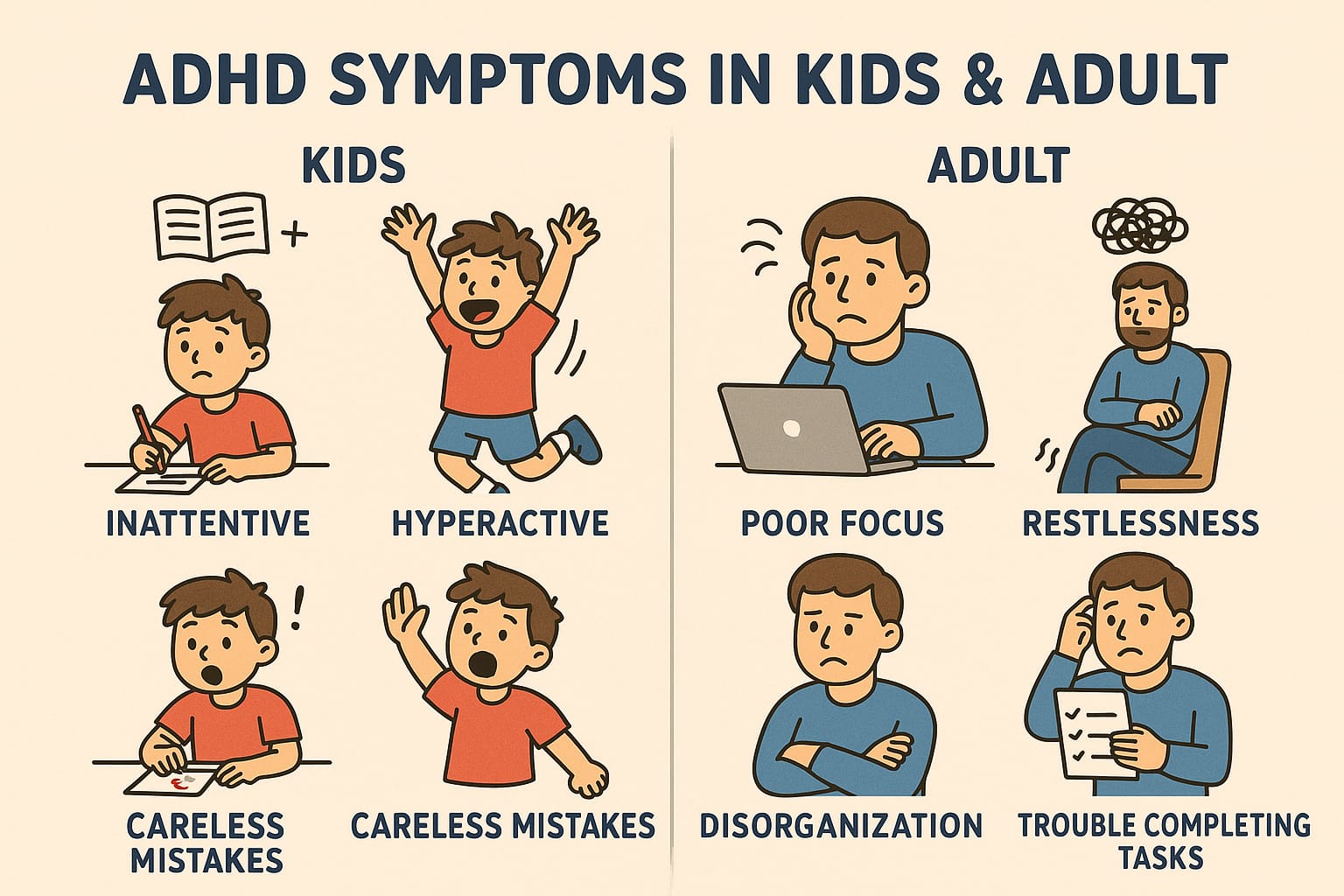ADHD online services have become a practical solution for those seeking assessment, diagnosis, and treatment without the delays of traditional in-person visits. These platforms offer a range of options from symptom tests to medication management and personalized support, making care more accessible across different regions.
The key advantage of ADHD online is the ability to receive expert-led, evidence-based care quickly and conveniently, often with tailored plans that address individual needs. This mode of treatment can include therapy, medication, and strategies to improve focus and productivity, all delivered remotely.
Many online providers use detailed assessments to diagnose ADHD and related conditions accurately. By combining technology with professional expertise, they aim to reduce wait times and improve treatment outcomes, offering an effective alternative to conventional methods.
Understanding ADHD Online
ADHD online resources cover definitions, assessments, and available services. They provide structured information on diagnosis processes, benefits of digital evaluations, and different support options suited to various needs.
What Is ADHD Online
ADHD online refers to digital platforms and courses designed to educate, assess, and support individuals with attention deficit hyperactivity disorder. It includes websites, virtual courses, and online communities focused on delivering accurate ADHD information.
These resources often explain symptoms like inattention, hyperactivity, and impulsivity. They also provide insight into the challenges faced by those living with ADHD, addressing both adult and childhood experiences.
Understanding ADHD through online tools allows individuals, parents, and educators to access current research and practical management strategies. This format often adapts scientific knowledge to easy-to-understand content, enhancing awareness and reducing stigma.
Benefits of Online ADHD Assessments
Online ADHD assessments offer accessible and efficient screening tools. They allow users to complete questionnaires or surveys in privacy, often speeding up initial evaluation stages.
These assessments can help identify symptoms and suggest whether professional diagnosis is advisable. They also accommodate people in remote areas or with limited time for in-person visits.
While not a substitute for clinical diagnosis, online assessments provide a useful first step. They often include tailored feedback and guidance on next steps, increasing early detection and intervention.
Types of Virtual ADHD Services
Virtual ADHD services include educational courses, therapy sessions, coaching, and support groups delivered remotely. These are designed for adults, parents, educators, and healthcare professionals.
Educational courses focus on ADHD fundamentals, coping strategies, and treatment options. Therapy and coaching address personalized needs, including behavioral management and emotional support.
Support groups and communities create spaces for sharing experiences and advice. Many platforms offer evidence-based and neurodivergent-affirming approaches, ensuring respectful and effective assistance.
Getting Started With ADHD Online Services
Accessing online ADHD services requires selecting a reliable platform, preparing thoughtfully for assessments, and understanding key privacy measures. Each step ensures a smoother process and a more accurate diagnosis or treatment plan.
How To Choose the Right Platform
Choosing the right platform involves evaluating factors such as licensing, expertise, and service offerings. Look for providers with licensed professionals, including nurse practitioners or psychiatrists experienced in ADHD. Some platforms, like Frida or Finding Focus, offer personalized treatment plans and academic or workplace accommodations.
Cost and wait times matter too. Online services often reduce wait times significantly compared to traditional clinics, sometimes providing appointments within days. Affordability varies, so consider subscription fees or one-time assessment costs. Patient reviews and customer support responsiveness can also reflect service quality.
Verification of medication prescribing capabilities is important if stimulant treatment is required. Some platforms have restrictions due to evolving regulations, so confirm this before proceeding.
Preparing for Online ADHD Testing
Preparation improves the accuracy of the assessment. Patients should gather relevant medical history, including prior diagnoses, treatments, and family mental health information. It’s helpful to have recent school or work evaluations if applicable.
During the appointment, a quiet, private space free of distractions is essential. Reliable internet access and a working camera and microphone help ensure the session proceeds without technical interruptions.
Patients should also prepare to discuss symptoms in detail, including their impact on daily life. Being honest about challenges and current coping mechanisms allows the provider to tailor care effectively.
Privacy and Security Considerations
Privacy is critical when using online ADHD services. Choose platforms that comply with healthcare privacy laws such as HIPAA in the U.S. or PIPEDA in Canada, ensuring protection of personal health information.
Secure communication channels and encrypted data storage prevent unauthorized access. Check if the provider uses secure portals for sharing test results and prescriptions.
Review privacy policies to understand how data is used and shared. Patients should also inquire about record retention durations and their rights to access or delete their information.



